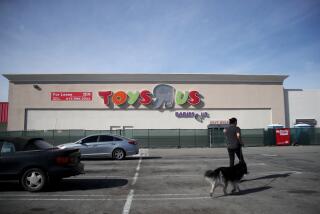Buyout firm KKR files to go public
- Share via
NEW YORK — Private equity pioneer Kohlberg Kravis Roberts & Co. filed plans Tuesday to sell as much as $1.25 billion of stock to the public, intensifying a debate about whether Wall Street’s buyout boom has hit a peak.
The limited partnership, which changed its name to KKR & Co. in conjunction with the filing, is following on the heels of rival Blackstone Group, which completed its own high-profile, $4.75-billion initial public offering two weeks ago.
Private equity firms are famous for secrecy, so their sudden willingness to go public has raised speculation that Wall Street’s smart money is cashing out just as the buyout frenzy is threatened by a variety of forces.
In fact, KKR may be too late, said Kelly Deponte, a partner at Probitas Partners, a San Francisco firm that helps private equity firms find investors. “It really feels like the top of the market for the ability of buyout firms to do large deals at a pace at which they’ve done them,” he said. “There isn’t the appetite for another [IPO] like this.”
Going public would help KKR compete against Wall Street investment banks and provide a way for founders Henry Kravis and George Roberts to eventually cash out their stakes in the 31-year-old firm.
An IPO also would be a symbolic capstone for KKR, whose acquisition of RJR Nabisco Inc. almost 20 years ago marked the biggest leveraged buyout, in which bands of financiers borrow enormous sums to purchase publicly traded companies and take them private.
RJR Nabisco remained the biggest leveraged buyout until last year, and the deal became the subject of the best-selling book “Barbarians at the Gate,” which captured Wall Street’s 1980s deal-making frenzy.
KKR’s IPO would be “a big event,” said Mario Giannini, chief executive of Hamilton Lane, which advises institutional investors on private equity investments. “That these companies are going public says something very significant about their size. They’re not just a couple of deal guys anymore.”
Nevertheless, KKR’s IPO plan comes as the sands under private equity firms show signs of shifting.
Skeptics question whether the industry can keep pulling off the huge deals that have fueled its breakneck growth. The biggest threat has arisen from the debt markets, which provide the lifeblood of the sector.
Rising interest rates have boosted the cost of doing deals while the sub-prime mortgage market’s collapse has stoked concern about risk in general.
In a sign of the change in thinking, within days of Blackstone’s IPO, the firm’s shares fell below their offering price. They have not touched that level since.
Although KKR was widely expected to do an IPO, the timing of its filing -- late on the day before the Fourth of July -- signaled that the firm wanted to avoid the hoopla and controversy that enveloped surrounded the Blackstone deal.
Amid a furor over the fortune that Blackstone CEO Stephen Schwarzman reaped from his IPO, several U.S. lawmakers proposed a big boost in the taxes that private equity firms pay.
Despite such pressures, several big deals in recent days, including Blackstone’s offer Tuesday to buy Hilton Hotels Corp. for $26 billion, demonstrate the considerable force that private equity firms continue to muster.
KKR’s private equity funds have returned an average of 20% a year after fees, according to KKR’s filing. The firm manages $53.4 billion in assets.
Unlike Blackstone, in which its top brass sold a portion of their holdings in the IPO, the KKR executives aren’t unloading any of their ownership stake.
--
More to Read
Inside the business of entertainment
The Wide Shot brings you news, analysis and insights on everything from streaming wars to production — and what it all means for the future.
You may occasionally receive promotional content from the Los Angeles Times.










